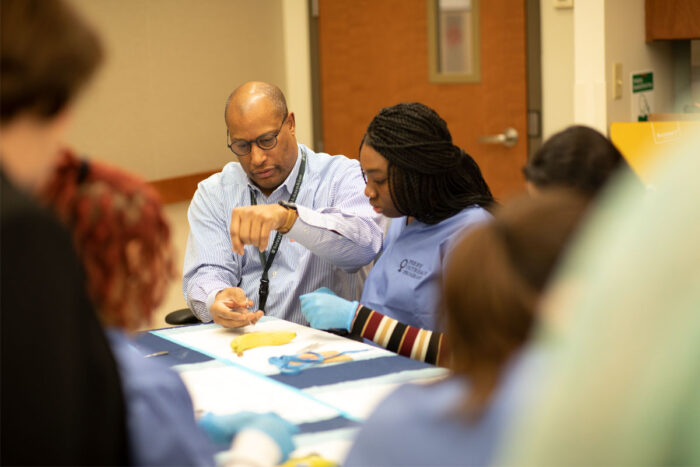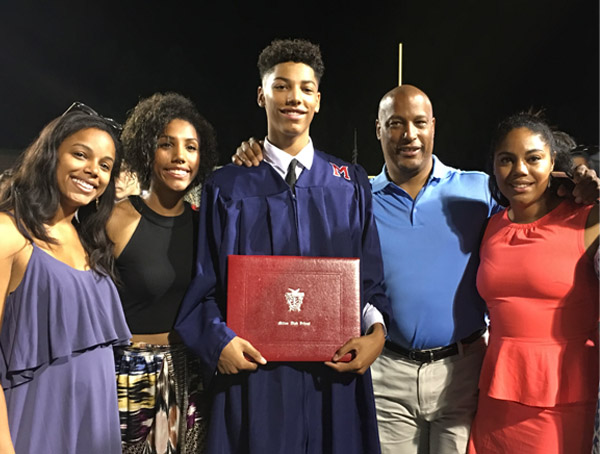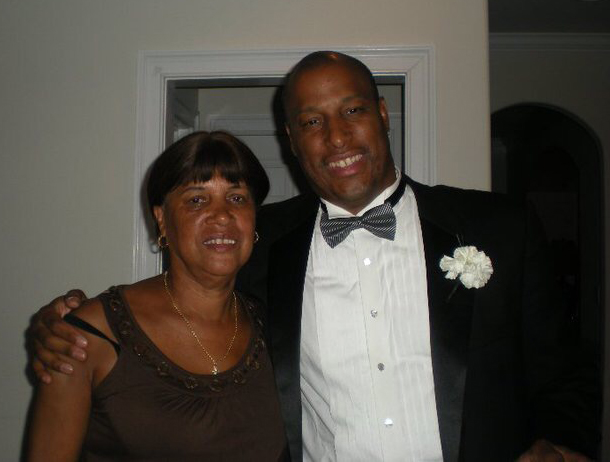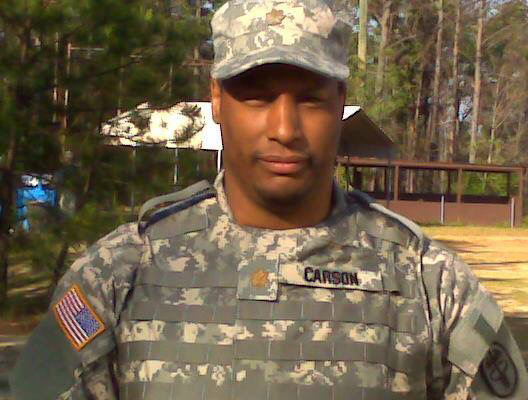Washington People: Eric W. Carson
Increasing diversity, mentorship in medicine are key goals for orthopedic surgeon
 Matt Miller
Matt MillerEric W. Carson, MD, professor in the Department of Orthpaedic Surgery at Washington University School of Medicine in St. Louis, demonstrates suture technique to high school students last winter as part of the Perry Initiative, a mentorship program aimed at getting young women interested in orthopedics and engineering.
While growing up in Boston’s inner city, Eric Carson didn’t think African Americans, like himself, could become physicians. But not only did he become a physician, he chose to work in orthopedics, a specialty noted for its lack of diversity.
Carson, one of four children raised by a single mother, was bused along with his siblings to more affluent, predominantly white suburbs for elementary and high school. To fill their free time, his mother enrolled them in a variety of activities run by nonprofit organizations such as the Boys & Girls Clubs of America.
“My mother is a hero from the perspective that she kept us all busy,” said Carson, now a professor in the Department of Orthopaedic Surgery at Washington University School of Medicine in St. Louis. “And the beauty of it all is that her sacrifices paid off for all four of her kids.” He and his siblings all have graduate degrees and successful careers.
As a youth, Carson became an avid athlete, playing high school and college football, running track and becoming a member of a ski team. “I excelled in football at Tufts University, enough to receive invites to professional football training camps for the fledgling United States Football League (USFL),” said Carson. But instead of pursuing his football prospects, he decided to attend the University of Illinois College of Medicine in Chicago for medical school.
From there, getting into orthopedics proved challenging. After Carson aced his Step 1 licensing exam, his adviser discouraged his interest in orthopedics, a highly competitive specialty with few underrepresented minorities in its ranks, particularly at the time. But with encouragement from a friendly resident he knew, Carson found a new mentor and surprised his class when he matched into orthopedics at Harvard University, back in his hometown.
Haunting experience
During his residency in Boston, Carson was walking down the street early one morning, on his way to rounds at the hospital. Suddenly, Boston Police officers appeared, wrestled him to the ground, handcuffed him and pointed a gun at his head, he recalls. They had been looking for a Black suspect in the recent murder of a pregnant woman. The victim’s husband had blamed the crime on a “Black man” with a physical description similar to Carson’s. The husband later admitted to killing his wife and then died by suicide. But the incident continues to haunt Carson to this day.

The episode is a reminder to Carson to not let his guard down, especially in light of the killings by police of George Floyd, Breonna Taylor and other unarmed Black people. He has made a point of stressing to his son, a Black man in his 20s, to always remain vigilant. Carson has been very open about his experiences, sharing them widely, particularly within the medical community.
While the incident in many ways changed Carson, he was careful to not let it stop his momentum. His time in residency ultimately was extremely rewarding.

“One amazing highlight of my Harvard University experience was working hand and hand with my mother,” he said. She was an orthopedic nurse at Massachusetts General Hospital (MGH), one of the hospitals where Carson worked while in Boston. “The proud look and smile my mother displayed regularly was infectious and directly related to my accomplishments.”
The two spoke every day until she died Dec. 1, after a battle with cancer. Carson is dedicating a grand rounds talk he has been giving about his life to her.
Trauma on steroids
Due to his strong interest in athletics, Carson continued his medical training with a fellowship in sports medicine, focused on the shoulder, at Cornell University’s Hospital for Special Surgery in New York. During this time, he assisted in orthopedic care for the New York Giants NFL team. He subsequently has worked with athletes at each institution he has joined, even becoming one of the physicians to work with the U.S. Rowing national team, which competes in the Olympics.
While training in Boston, he and his wife also prepared for the birth of their second child. The young family was struggling to get by on a resident’s salary. He had always admired two of his uncles for their decisions to join the military. So he decided to join as a reservist with the U.S. Army Medical Corps.
Carson went on to be deployed three times: once to Fort Carson near Colorado Springs, Colo., to fill in for surgeons of the 4th Infantry Division, who were sent overseas during Operation Iraqi Freedom; then to Germany’s Landstuhl Regional Medical Center, the largest U.S. military hospital outside the continental United States; and, finally, to Kosovo in Eastern Europe, where he worked in a war zone supporting the Kosovo Force, a NATO-led peace mission.

Operating all day almost every day, Carson said the experience of performing surgery on soldiers wounded in battle was eye-opening, like “trauma on steroids.”
By the time Carson left the military, he had been promoted from Captain to Lieutenant Colonel. “It was a great experience,” he said. “But it was time to move on to other things.”
Throughout his deployments, Carson held faculty positions at Emory University in Atlanta, followed by Louisiana State University School of Medicine in New Orleans, and then at the University of Virginia in Charlottesville, Va.
At Virginia, he pursued an important personal goal: recruiting underrepresented minorities into the orthopedic surgery residency program under the direction of Cato Laurencin, MD, PhD, the department’s chair at the time. Laurencin is greatly admired in orthopedic surgery and biomedical engineering, partly for his focus on encouraging diversity in the ranks.
“We all want to be around people who look like us, who talk like us, who can understand us,” said Carson. While he was at Virginia, the orthopedic surgery residency program did indeed become more diverse, as Carson recruited an additional faculty member of color.
The road to St. Louis
Carson’s move to St. Louis stemmed, in part, from a lasting friendship with Regis O’Keefe, MD, PhD, the Fred C. Reynolds Professor and head of Washington University’s Department of Orthopaedic Surgery. The two met during Carson’s residency at MGH, where O’Keefe was a fellow under Henry Mankin, MD, a renowned tumor surgeon who trained generations of orthopedic leaders.
Like Carson, O’Keefe was raised by a single mother in a poor neighborhood, though O’Keefe grew up in Pittsburgh. The two doctors quickly formed a friendship, bonding over a shared goal of increasing recruitment of people from lower socioeconomic backgrounds and underrepresented minorities in their field. They stayed in touch after their training days, and when a job at Washington University opened up in 2019, Carson contacted O’Keefe, who was eager to hire him.
“Dr. Carson has a unique awareness of how other people are doing, where they may be struggling, and when and how, in a really thoughtful way, to be there for them and help them through issues,” said O’Keefe. “And when you have individuals like that, it creates a culture of caring.”
Carson joined the faculty and also was named chief of orthopedic surgery at John Cochran VA Medical Center in St. Louis — a role he said is greatly influenced by his military background.
“My service definitely gives me the opportunity to understand veterans and really be sympathetic and empathetic to a unique group of patients,” he said.
O’Keefe said he wanted to expand the orthopedic training program at the VA and that Carson has brought renewed energy and vision to that endeavor. “With his leadership, it is now a highlight for our trainees to rotate through the VA, work with Dr. Carson and get a sense of accomplishment for helping the veteran population,” O’Keefe said.
The mentor he always wanted
Because of Carson’s strained relationship with an assigned adviser in medical school, he has made a point of mentoring and sponsoring others who may be struggling like he did. He also has taken on the role of president of the J. Robert Gladden Orthopaedic Society, a national organization that aims to promote diversity in orthopedics by increasing overall representation of black orthopedic surgeons (currently 1.9%) in the field and developing a robust mentorship program.
“I lacked a mentor. I then became a mentor,” said Carson. He has been involved with a number of mentorship opportunities, including serving as a mentor in Nth Dimensions, a pipeline program for underrepresented students interested in orthopedics, as well as the Perry Initiative, a program aimed at getting young women interested in orthopedics and engineering. Carson, along with other faculty, residents and medical students at the School of Medicine, spent a Saturday last winter mentoring girls from a St. Louis high school.
Many of the students and trainees he has mentored have gone on to become mentors themselves, he said.
“Being around people who are like you creates a safe environment,” added Carson. So it is not unusual for him to reach out to students or residents he hears may be struggling, to offer help and support.
He also has continued his commitment to recruiting underrepresented minorities. Thanks in large part to Carson, the last two residency classes (totaling 16 residents) have been made up of 50% women, and nearly one-third of the total were underrepresented minorities, said O’Keefe. And Carson even has helped recruit minority faculty to other parts of the university, such as the School of Law and Olin Business School.
Prior to coming to Washington University, Carson said he hadn’t really thought of himself as a leader. Now he is not only directing orthopedic care at the VA, he is leading the way for a more diverse, equitable and inclusive environment in his department and throughout the medical school.
“For me,” he said, “what it comes down to is making a difference in people’s lives.”







